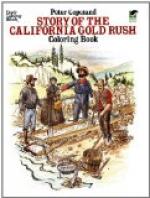A company was formed to develop this forty-two square miles of land, and to get water for irrigation, since all the trees must have little streams of water round their thirsty roots three or four times during the dry summer. A great dam was constructed on the Sweetwater River, near Chula Vista, and a reservoir built. Water was piped from this to the lemon groves, which are about a hundred feet below the reservoir, and from May to September the trees are irrigated. This is done by ploughing furrows on each side of a row of trees and turning small rills of water slowly down them till the ground is soaked around the tree roots. No one thought the great reservoir would ever be empty, but two winters with but little rain made it necessary to put down many wells in the dry bed of the Sweetwater River, and from these a strong steady flow of millions of gallons is pumped into the water pipes. So this great lemon orchard is always sure of water enough, returning the gift later in generous golden measure.
One may pick lemon blossoms, ripe and green fruit every month in the year from the same tree, but most of the crop ripens from November to June.
Lemons are carefully cut from the tree, and usually picked by size, a ring being slipped over them, without regard to their ripeness. They grow so thick on the tree that a man can pick more than twenty boxes a day. In preparing it for market the fruit “sweats,” as it is called, in airy boxes, for a month in winter and ten days in summer, and ripens and colors during this process. Then each lemon is wiped dry and clean, wrapped separately in tissue-paper, and packed for shipment. The cost of a box of lemons from the tree to the railroad is about thirty-five cents.
Thousands of car-loads are shipped to the Eastern and Middle states, while the Pacific Coast is a never-failing market.
Small, imperfect, and bruised fruit goes to the citric acid factory near the packing-houses. From these oil of lemon, lemon sugar, and clear green citric-acid crystals are made, and the crushed waste is returned to the grove and ploughed in about the trees as a fertilizer.
FLOWERS AND PLANTS
“When California was wild,” says John Muir, “it was one sweet bee-garden throughout its entire length, and from the snowy Sierra to the ocean.”
There were so many yellow poppies in this great unfenced garden, that the Spanish sailing along the coast called it the “Land of Fire” from the golden flowers covering the hills. Near Pasadena, in Southern California, these poppy fields may still be seen glowing so brightly in the sun that you do not wonder at the name “Cape Las Flores,” or Flower Cape, which the sailors also gave to this part of the country.
[Illustration: In A mission garden.]
[Illustration: A Christmas garden.]




